PEN eNews 6(1) June 2016
PEN
® eNews is a monthly e-newsletter shared with the global PEN Community and created to help dietitians position themselves as leaders in evidence-based nutrition practice. In addition, users of the PEN System will find articles on the new evidence, resources and features available and how to maximize one's use of PEN.

Feeling overwhelmed by nutrition information? Supplement your knowledge in bite-sized doses!
In 2013, there were 17,961 citations in the PubMed database that included the term “nutrition”; in 2014 and 2015, the numbers grew to be 23,521 and 27,733, respectively. If we consider nutrition's grey literature, then there are even more publications available! I feel like I am drowning in information and I wonder how I will possibly stay afloat in the field amidst this information tsunami? 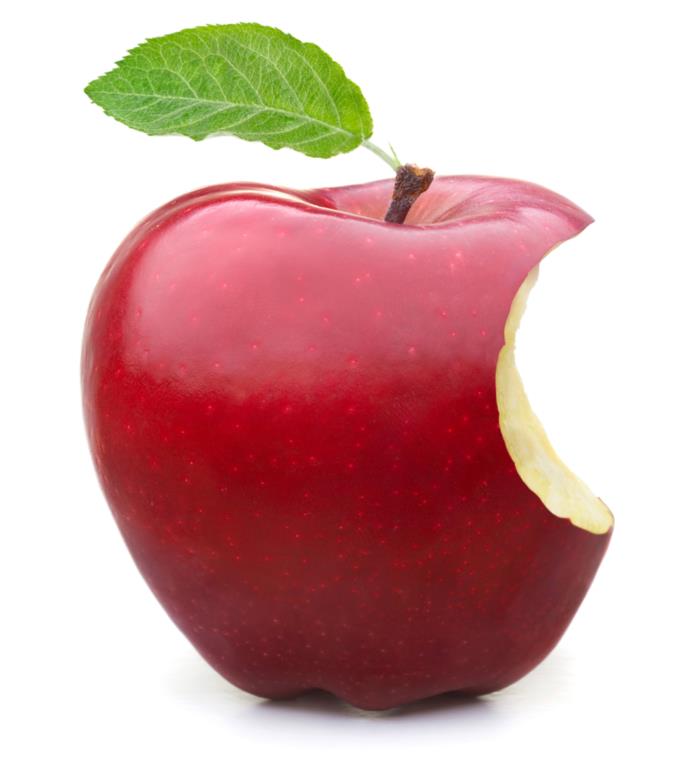
One author described the situation of information overload as producing more pain than gain. And that it is not just emails – it is the “ocean of information” that he felt “compelled to go out and explore in order to keep up” in his job. Emails, multiple social media accounts, journal table of contents, journal articles, systematic reviews, nutrition in the news (and more) – all sources of information for dietitians and nutritionist to review and manage, let alone, be able to get any actual work done! How do we design a system of information management so that we have a mechanism to stay appraised of key issues in our areas of practice? This is the million-dollar question!
Managing nutrition information is a marathon, not a sprint. We need to pace ourselves to find, examine and evolve our knowledge over the long haul. For me, I supplement my knowledge in bite-sized doses of practice-guidance and alerts from nutrition knowledge subscription services, as well as memberships to different networks relevant to my practice area. These purposely-designed systems of information management give me confidence that my practice will receive timely beacons around important knowledge updates, and that my nutrition practice will evolve as needed. I’d be interested in hearing about your experiences in managing the tsunami of nutrition information. Email me at eNews@pennutrition.com.
In this issue of PEN eNews 6(1), we share articles and highlight resources to help advance your practice:
- My PHD journey – the long road to success describes a dietitian’s experience in completing her PhD.
- 70 Evidence-based healthy living videos for parents and care providers now available! profiles 70 freely available evidence-based videos for use in your practice.
- How is PEN® “GRADE”ing the evidence for you? outlines the advantages of the GRADE system for dietitians.
- Celebrating 40 Years at the Dietitians Association of Australia’s National Conference describes the celebration of this milestone.
- Canada recognizes its first PEN® Achiever Award recipients acknowledgies the contributions of two Canadian PEN contributors and Dietitians of Canada members.
- ‘Take a 100 Meal Journey’ during Nutrition Month 2016 describes highlights of the successful Canadian Nutrition Month advocacy campaign.
- Enjoy PEN eNews 6(1)!
References:
Hemp P. Death by information overload. Harvard Business Review. Available from: https://hbr.org/2009/09/death-by-information-overload
Kristyn Hall MSc, RD
Editor, PEN® eNews
A Publication of the PEN
® System Global Partners, a collaborative partnership between International Dietetic Associations.
Learn more about PEN. PEN
® eNews may contain links to other external websites. PENnutrition.com is not responsible for the privacy practices or the content of such external websites. Neither Dietitians of Canada, nor any dietetic associations contributing to or licensing the content in Practice-based Evidence in Nutrition: PEN
® endorse the content, products or services on other websites.
What's New in PEN
New Sports Nutrition handouts available in PEN

Have you seen our new handout collection on sports nutrition? We have 8 new handouts, available in English and French, to use with your clients including:
- Refueling to Recover After Exercise
- Fueling Up Before Exercise
- Sports Supplements – Get the Facts
- Sports Hydration; Get the Facts
- Protein in Sports Nutrition
- Carbohydrates in Sports Nutrition
- All about Sports Drinks
- Weight Loss During Sports Training
These additions expand the diversity of handouts available in our handouts collection. To see these, and other handouts available, click here.
Below is a quick glance at some of the new and updated content in the PEN
® knowledge database.
Look for the new  and updated
and updated  symbols in PEN to see more new and enhanced content!
symbols in PEN to see more new and enhanced content!
Updated Knowledge Pathways
New Practice Questions
Trending Topics
Updated Practice Questions
New Knowledge Pathways
Professional Tools
Client Tools
Did you see these Trending Topics published in the last 2 months?
Did you hear about the study linking folate during pregnancy and autism? Or how practice guidance on food allergy prevention in infants has evolved? These were just two of our eight recently published Trending Topics in the PEN® System. Trending Topics is the section in PEN where we post the latest evidence-based responses to nutrition-related topics in the news.
These were just two of our eight recently published Trending Topics in the PEN® System. Trending Topics is the section in PEN where we post the latest evidence-based responses to nutrition-related topics in the news.
Did any of your clients or colleagues ask you about these headlines or topics?:
-
Newly Released Report on Genetically Engineered Crops
-
Folate During Pregnancy and Autism - A Recent Study
-
Iodine Deficiency in the U.K.
-
Evidence Clip: Food Allergy Prevention in Infants
-
Article Analysis: Cardiovascular Effects of Exchanging Saturated Fat With an Oil High in Linoleic Acid - Not all Vegetable Oils are Created Equally
-
Two Actions on Global Hunger and Malnutrition
-
Global Study on BMI Trends
Visit Trending Topics regularly for the latest evidence-based responses to nutrition-related topics. Here is how you can access Trending Topics and sign up for content alerts.
Written by:
Kristyn Hall MSc, RD
Editor, PEN eNews
My PHD journey – the long road to success
This article was originally printed in Dietetics Today, a publication of the British Dietetic Associat ion. It is reprinted here with permission.
ion. It is reprinted here with permission.
Sammie Gill recently joined the British Dietetic Association (BDA) as the Policy Officer (Evidence-based Practice) including an active role for PEN. Not so long ago she also qualified as a dietitian and completed a PhD. In this article she looks back on her learning experience and shares some tips for those who are thinking of taking on academic research.
I started life as a PhD student five years ago when I applied for a Masters by Research (MRes) studentship in Exercise Immunology at Coventry University in the summer of 2010. My MRes involved a trip to Spain with the Coventry University Sports and Exercise Nutritional Support and Research Team in the summer of 2011 to collect samples from runners taking part in a five-day multi-stage ultra-marathon. It was my first hands-on experience of field research and a completely new environment and way of working.
Data collection had to run smoothly and I remember having very little sleep and I couldn’t properly relax until the study was over. Equally, it was one of the best experiences I’ve had to date. At this time, Coventry University was also advertising PhD studentships. Having discussed this with my Director of Studies, my PhD application involved continuing to explore immune responses to ultra-endurance exercise (which to date is limited) whilst investigating the influence of probiotics on immune function (a new area within exercise immunology research).
My application was accepted and soon after, organisation of the second field-based study (24 hour continuous ultra-marathon) started. This involved two trips to the Scottish Highlands in 2011 and 2012. After this, focus was on the probiotic study based in the labs at Coventry University. At the same time, we carried out a further smaller scale study at the university to support our previous research.
Reality check
The reality of completing a PhD is an extremely heavy work load which is full on and continuous. I would compare my PhD journey to being on a treadmill; at times you’re running at your maximum, and at times it dips to a fast jog, but it rarely goes below that. It’s also true what people say it does completely dominate your life in many ways; you live and breathe research. On the other hand, the opportunities and experiences I’ve been given in the last five years I’ll be forever grateful for and I’m excited about where my career path will lead me. I’ve also been extremely lucky to have such a supportive Director of Studies throughout.
One of the most important things I would say to those considering undertaking a PhD is that you have to thoroughly enjoy your research topic and be passionate and dedicated about what you’re doing, otherwise the enthusiasm may start to wane as the work starts to pile up. It’s also important to have an idea of where you would like it to take you. Developing your research and writing skills takes time and effort. When writing a journal article, it is reviewed countless times by your supervisory team, before it is formatted and tailored to meet the needs of a specific journal. Once your paper has been reviewed, there will be changes and adjustments to make; it can take months before it’s accepted and published. Sometimes it can be a little disheartening, especially when you’re relatively new to the research process and your paper has been critiqued extensively; but that’s the reality. Equally, reviewers are there to improve your paper and their feedback is very useful. It is important to remember that reviewers are experts in your field and have taken the time to read and help improve your paper.
A rewarding process
Although I didn’t initially set out to do a PhD after my undergraduate degree, it’s the best decision I could have made. I’ve been put in many challenging situations over the last five years and it’s been a steep l earning curve but I’ve grown so much as a person because of it. Looking back, it’s been a very rewarding process and I’ve also met some fantastic people who I’m still in regular contact with. It feels like a never-ending journey at the time but it’s a wonderful feeling when you finally start to see everything slotting into place. I submitted my thesis in October 2015 after five years. I’ve also been involved in many other projects outside my PhD which I never would have experienced otherwise and have very much appreciated being a part of them.
earning curve but I’ve grown so much as a person because of it. Looking back, it’s been a very rewarding process and I’ve also met some fantastic people who I’m still in regular contact with. It feels like a never-ending journey at the time but it’s a wonderful feeling when you finally start to see everything slotting into place. I submitted my thesis in October 2015 after five years. I’ve also been involved in many other projects outside my PhD which I never would have experienced otherwise and have very much appreciated being a part of them.
As well as research, I developed a very keen interest in dietetics during my undergraduate degree. I subsequently completed a postgraduate certificate in weight management during my MRes year to continue my learning around nutrition. I concentrated solely on my PhD for the next few years with the mind-set that I would study dietetics when the time was right. In my final PhD year prior to write-up, I applied to do the postgraduate diploma in dietetics. I was lucky enough to get offered a place at the University of Chester and I qualified as a dietitian this year.
If you are interested in an MRes and live or work in England, Health Education England together with the National Institute for Health Research (NIHR) currently funds ten higher education institutes to provide the Masters in Clinical Research for health professionals such as dietitians. For more information, click here.
The next round of the clinical doctoral research fellowships opens in March, feedback suggests that it takes about a year to get a good application together, contact BDA research officer, Judy Lawrence for further information.
Written by:
Sammie Gill, RD, BSc (Hons), PGDip, R.SEN, PhD (candidate)
Policy Officer (Evidence-based Practice), British Dietetic Association (BDA)
70 Evidence-based healthy living videos for parents and care providers now available!
Within your practice, could you use short, evidence-based videos on nutrition and healthy living that can help parents raise healthy, active kids?
About the videos
Raising Our Healthy Kids is a series of clever 1-2 minute videos p roviding information to parents and care providers on healthy growth and development of children up to 12 years of age. The videos provide information on general nutrition, active play, healthy growth and development including positive body image and understanding how marketing affects choices and food intake.
roviding information to parents and care providers on healthy growth and development of children up to 12 years of age. The videos provide information on general nutrition, active play, healthy growth and development including positive body image and understanding how marketing affects choices and food intake.
The videos can be freely shared and used as teaching resources and discussion generators. You can show them in a waiting room or clinic area; have them added to hospital/agency TV channels and/or website; and even email them to your clients.
In a nutshell:
- There are 70 videos in total on a variety of healthy living topics.
- 26 of the videos are specifically related to nutrition with 25 of these translated into French.
- The videos were created by health professionals and are evidence-based.
- There have been 30,000 downloads in over 100 countries to date.
What are the videos about?
The videos cover a number of topic areas and they have been divided into 11 channels:
The French translated videos are available from: Saine alimentation Ontario
As a professional, do I need permission to use and distribute them?
You are free to use these videos in any way you can to help families’ live healthier lives. They are free from branding and bias. You do not need to ask permission to use them, nor do you need to write any form of acknowledgement. The videos were created to be used to help families with children and we want them to be used!
The content of the videos is national in scope and is consistent with messages from Health Canada, Public Health Agency of Canada, Alberta Health Services, and nutrition messages are consistent with PEN: Practice-based Evidence in Nutrition®. That said, the simple messages will resonate with audiences around the world.
Who developed the videos?
The videos were the result of the vision and leadership of dietitian Kay Watson-Jarvis. The videos were developed by a multi-stakeholder group including Dietitians of Canada/PEN and Alberta Health Services and with input from a pediatrician and community stakeholders across Canada.
Funding was provided by Government of Alberta, Calgary Health Trust, and Canadian Institutes of Health Research, and the videos were produced by Shadow Light Productions. Financial support for French translations was provided by EatRight Ontario.
You can access the videos from four areas:
Raising Our Healthy Kids website: http://www.raisingourhealthykids.com
Vimeo site: https://vimeo.com/raisingourhealthykids
Dietitians of Canada: http://www.dietitians.ca/Your-Health/Videos/Raising-Our-Healthy-Kids.aspx
PEN: Practice-based Evidence in Nutrition®: http://www.pennutrition.com
Written by: PEN® Resource Managers
Jane Bellman MEd, RD
Kerri Staden BSc, RD
jane.bellman@dietitians.ca
kerri.stade@dietitians.ca
How is PEN® “GRADE”ing the evidence for you?
PEN® has joined more than 100 organizations around in the world in using the GRADE system! To help dietitians understand the advantages of the GRADE system, how it will it impact what we see in PEN®, and how as dietitians we can interpret and use this information in our practice, we presented The new face of PEN®: “GRADE”ing the evidence for you at the national Dietitians of Canada Annual Conference.
 GRADE stands for Grading of Recommendations, Assessment, Development and Evaluation.
GRADE stands for Grading of Recommendations, Assessment, Development and Evaluation.
GRADE recommendations have two parts:
- Reviewing the evidence and indicating the quality of evidence, from high to very low.
- Our confidence in the actual results decreases with decreasing quality of evidence. For high quality evidence, we can be very confident in a result (called the effect estimate) or have little confidence in the effect estimate for very low quality evidence. We looked at examples of evidence tables to gain an appreciation of the factors considered in assessing the quality of evidence.
- Making a recommendation and indicating how strong a recommendation is. Developing a recommendation for a proposed course of action involves balancing benefits and harms, patients’ values and preferences, and the resources required to implement the intervention in question. We went through examples of strong and conditional recommendations, and the justification for these recommendations.
Reviewers play a key part in the PEN GRADE process. GRADE recommendations explicitly provide the key underlying information needed to act on a recommendation. Therefore reviewers’ feedback is necessary in several steps of the process from question identification to developing the recommendation. International review panel (IRP) members represent academic experts and practitioners with acknowledged expertise in topic areas. IRP members may be involved in:
- Reviewing the questions and identifying patient-important outcomes
- Reviewing the search strategy and literature retrieved
- Providing feedback on the evidence tables and recommendations.
One of the many benefits of moving to the PEN® GRADE process includes helping readers understand how we arrived at a recommendation, thereby making recommendations more transparent. We are currently in a transition phase with GRADE implementation into the PEN® system. Some questions that deal with diagnosis or prognosis, will use our existing PEN process. We will be focusing on using GRADE for intervention questions in PEN when we update and develop new content.
Dietitians, there are opportunities for you to be involved in the PEN® GRADE process:
Celebrating 40 Years at the Dietitians Association of Australia’s National Conference
The Dietitians Association of Australia (DAA)’s 33rd National Conference in Melbourne was the perfect occasion to celebrate 40 years of DAA, with more than 1,000 delegates present over the three-day program. Keep an eye out for a future edition of PEN eNews which will provide a wrap-up of the conference program and workshops.
The DAA stand at the trade hall was interactive - allowing dietitians to share how long they had been part of this fantastic profession, as DAA members. The graffiti-style of the c

elebration ‘black-board’ was very fitting, given we were surrounded by

Melbourne’s iconic graffitied laneways.
Our conference networking event, held at waterside restaurant ZINC in Federation Square, Melbourne's central train station, was a lovely night. Themed ‘Black and Bling’, there were lots of sparkles to be seen. DAA President Liz Kellett addressed the crowd and cut the fabulous cake - a black and silver mini Federation Square.
Not only was DAA celebrating a birthday, but many of our members have been with us since the start. Several DAA members have had continuous membership for 40 years and were acknowledged at the conference.
To see the full list of delegates who have held continuous membership for 40 years, visit the DAA website.
Author: Natalie Latham APD
Communications Dietitian
Dietitians Association of Australia
communications@daa.asn.au
Canada recognizes its first PEN® Achiever Award recipients
Dietitians of Canada recognizes the outstanding contributions of its members to the PEN® System with the PEN® Achiever (Canada) Award. Expertise that contributes to the evidence-based knowledge of the profession and demonstration of leadership in evidence-based practice by DC members in contributing their expertise to international knowledge transfer are recognized with this Award. There were very strong nominations, in this our inaugural year and we are very pleased to share a little bit about our 2016 Dietitians of Canada PEN® Achiever (Canada) Award recipients.
Bethany Singleton – Alberta and Territories Region, Canada
 Bethany Singleton’s involvement with PEN began in her fourth year of nutrition studies at the University of Alberta through an assignment to develop a PEN® pathway for choline as her final research project. Of the experience, Bethany says “as there were no practice questions or background information for choline, I had the opportunity to be involved in creating new content from the ground up.” Since this time, Bethany has worked with members of the PEN® team on several different projects including an analysis of PEN® social media activities and the Marketing and Communications Plan; writing and reviewing the adult chronic kidney disease content; and the peptic ulcer disease PEN® toolkit. Bethany is recognized for her attention to detail and thoroughness in identifying and synthesizing the evidence, and talent for organizing and translating varied content into guidance for the practitioner.
Bethany Singleton’s involvement with PEN began in her fourth year of nutrition studies at the University of Alberta through an assignment to develop a PEN® pathway for choline as her final research project. Of the experience, Bethany says “as there were no practice questions or background information for choline, I had the opportunity to be involved in creating new content from the ground up.” Since this time, Bethany has worked with members of the PEN® team on several different projects including an analysis of PEN® social media activities and the Marketing and Communications Plan; writing and reviewing the adult chronic kidney disease content; and the peptic ulcer disease PEN® toolkit. Bethany is recognized for her attention to detail and thoroughness in identifying and synthesizing the evidence, and talent for organizing and translating varied content into guidance for the practitioner.
Doris Gillis – Atlantic Region, Canada
 Dr. Doris Gillis embodies professionalism with her commitment to grounding her practice in evidence and giving back to the profession by contributing to building our knowledge base. Practitioners in Canada and internationally have benefited from her multiple contributions to the PEN® System in areas such as health literacy, nutrition education resource development, food skills and cultural competence. In her role as Associate Professor and Chair of the Department of Human Nutrition at St Francis Xavier University, Doris has championed PEN® since its inception with students and colleagues. Doris is recognized with a PEN® Achiever (Canada) Award for her commitment to evidence-based practice and for engaging students in developing critical thinking skills while highlighting the role and responsibilities of dietitians to advance knowledge and be leaders in the information society in which we practice.
Dr. Doris Gillis embodies professionalism with her commitment to grounding her practice in evidence and giving back to the profession by contributing to building our knowledge base. Practitioners in Canada and internationally have benefited from her multiple contributions to the PEN® System in areas such as health literacy, nutrition education resource development, food skills and cultural competence. In her role as Associate Professor and Chair of the Department of Human Nutrition at St Francis Xavier University, Doris has championed PEN® since its inception with students and colleagues. Doris is recognized with a PEN® Achiever (Canada) Award for her commitment to evidence-based practice and for engaging students in developing critical thinking skills while highlighting the role and responsibilities of dietitians to advance knowledge and be leaders in the information society in which we practice.
Submitted by:
Jayne Thirsk RD, PhD, FDC
Director, Practice-based Evidence in Nutrition®
‘Take a 100 Meal Journey’ during Nutrition Month 2016
Make small nourishing changes to improve diet quality and decrease quantity – this was the theme of the Dietitians of Canada’s 2016 Nutrition Month campaign. We generally eat 100 meals in a month so chose the creative slogan ‘Take a 100 Meal Journey. Make a small change one meal at a time.’ 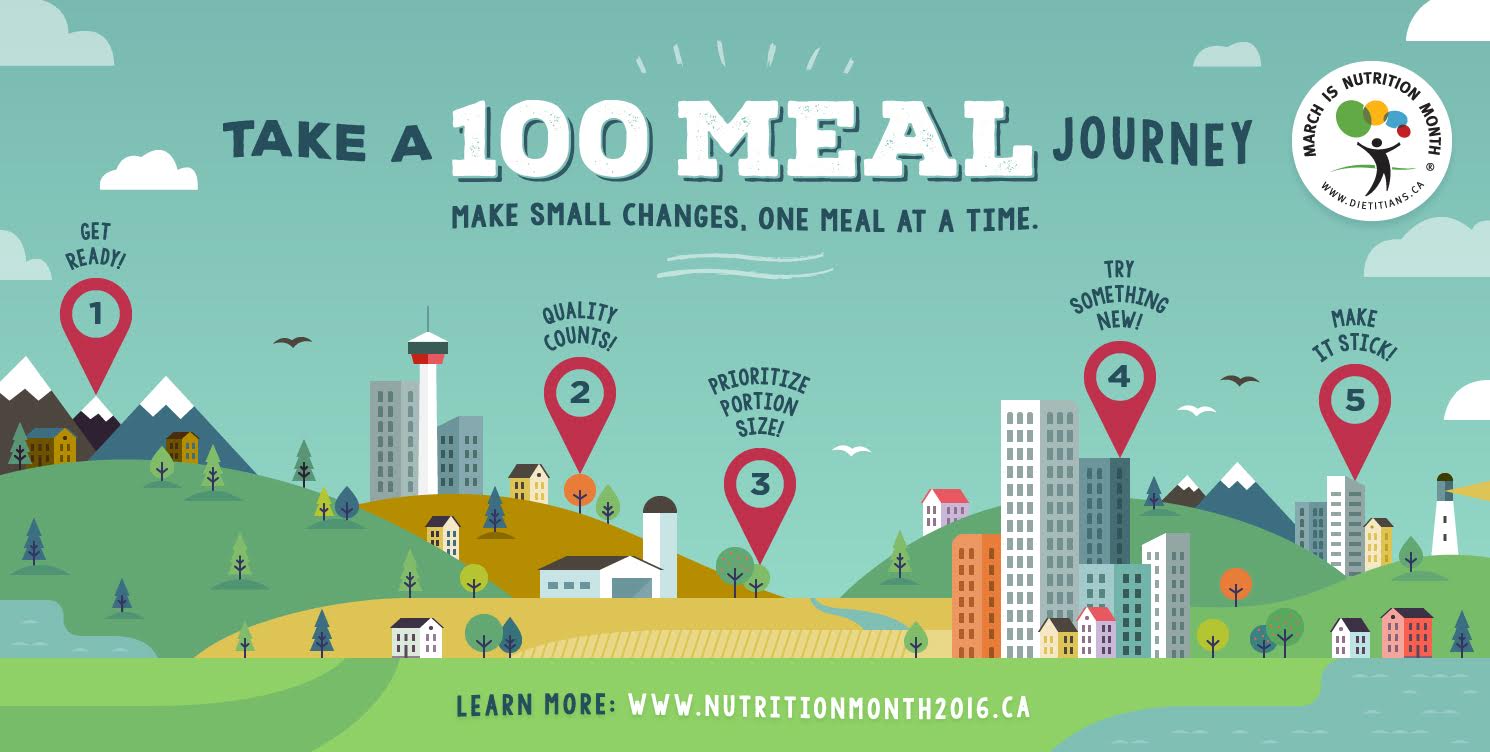
Encouraging clients and patients alike to make food, nutrition and lifestyle change is the cornerstone of what many dietitians do. Research shows that the highest morbidity and mortality rates are linked to diet quality and quantity – and so these were chosen as the focus for the campaign (1).
We aimed to inspire people to make one small nourishing change and stick with it throughout March. We created a pledge tool and certificate for those taking part to publicly declare their commitment, which added a new element for dietitians to feature with their Nutrition Month activities.
Five main topics were featured (one per week) including:
-
Get ready! Week 1 encouraged Canadians to determine whether they were ready to make diet and lifestyle changes.
-
Quality counts! Week 2 encouraged Canadians to focus on health-promoting foods.
-
Prioritize portion size! Week 3 focused on raising awareness of our portion sizes.
-
Try something new! Week 4 invited Canadians to expand the list of foods they eat to promote their health.
-
Make it stick! Week 5 invited Canadians to maintain their diet and lifestyle changes.
These themes provided Canadians with the framework for change, including a multitude of ideas to begin in March, which could be continued monthly or any time when ready!
The campaign began with our press release on February 23 with a keen media interest through to March 30. Dietitians participated in hospital settings, businesses, fitness centers, universities, schools, governments and grocery stores.
Dr. Jane Philpott, Canadian politician and Federal Minister of Health, chimed in challenging Canadians “what change will you make?” on Twitter and releasing a letter in greater detail promoting the campaign.
Here is a snapshot of the Nutrition Month activity:
-
There were 21 regional representative teams who organized more than 400 events across Canada!
-
We had 19 spokespeople who faced the media with our array of key messages.
-
We had over 60 million media impressions (an increase of 12% from 2015) and 317 stories (an increase of 32% from 2015) the widest reaching Nutrition Month campaign ever by Dietitians of Canada (since 1982).
-
We trended for more than 8 hours on twitter on Dietitians Day (March 16th).
-
here were 81,000 Nutrition month documents downloaded with a distribution of over 3 million – a 10 fold increase from the previous year.
Dietitians and the public alike joined our Nutrition Month journey from coast to coast!
Campaign reflections
I find it inspiring to work on a project that is larger than me. Any professional can lend their hand in having material be developed for fellow colleagues. That’s the easy part. But when so many diverse groups join in and enthusiastically take part in the campaign, it is like a freight train rolling down the tracks, almost unstoppable.
Seeing dietitians on social media channels, in the media, at MLA (Canadian Member of the Legislative Assembly) events, in grocery stores, on webinars, at farmers markets, in schools, colleges and universities, in hospitals and various workplace settings promoting ‘A 100 meal journey’ singing from the proverbial same song sheet during March – that’s the true test of when the campaign comes to life. Some of the wisdom in the book Good to Great comes to mind, that for anything to be a success it never is one big initiative that was done, but numerous small ones, like pebbles of sand dribbling down a mountain to create an avalanche.
For a visual summary of this month, have a look at our
Nutrition Month sizzle reel.
References:
1) Dietitians of Canada. Nutrition Month 2016 Campaign Backgrounder. Take a 100 Meal Journey: Make small changes, one meal at a time. © Dietitians of Canada, 2016. Available to members at www.dietitians.ca
Written by
Francy Pillo-Blocka RD FDC
Nutrition Month Manager, Dietitians of Canada
Food & Nutrition Communications Consultant
Thick and Thin Enterprises
LinkedIn | Blog | Twitter
PEN does not have editorial or other control over the contents of the referenced Web sites. We are not responsible for the opinions expressed by the author(s) of the knowledge transfer events and do not endorse any product or service.
10 Things to do on the new PEN® website
Last month, we unveiled a new look to our PEN® website! Here are 10 things to do in the new PEN® Website.
1. Take a tour! Once logged in you can take a tour of the Dashboard or home page from the PEN Tours page:
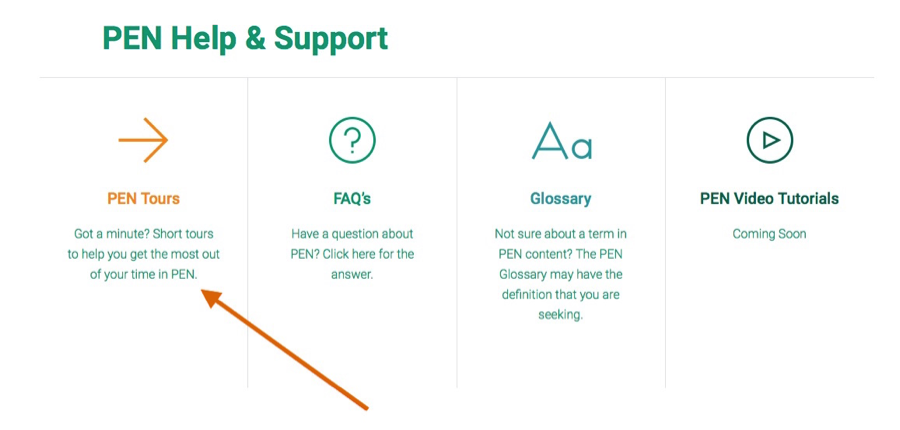
2. Explore the Table of Contents! Regardless of your practice area, we have content and resources to help your dietetic practice. See how we can help power up your practice.
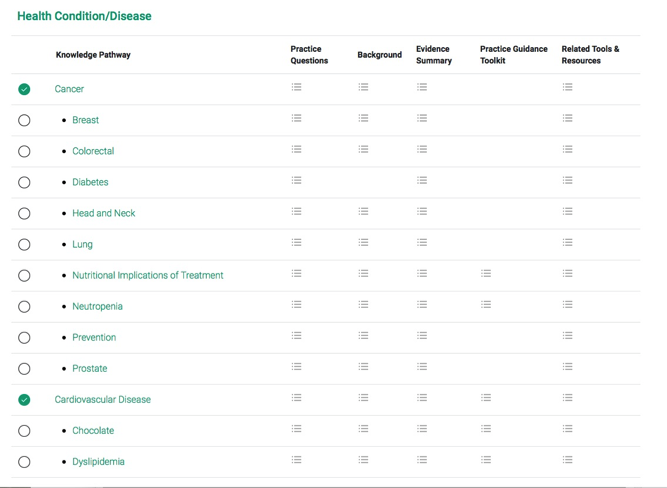
3. Sign up for Content Alerts! With this feature, you can sign up for alerts for your preferred knowledge pathways and our Trending Topics section! Once logged in, you can sign up here.
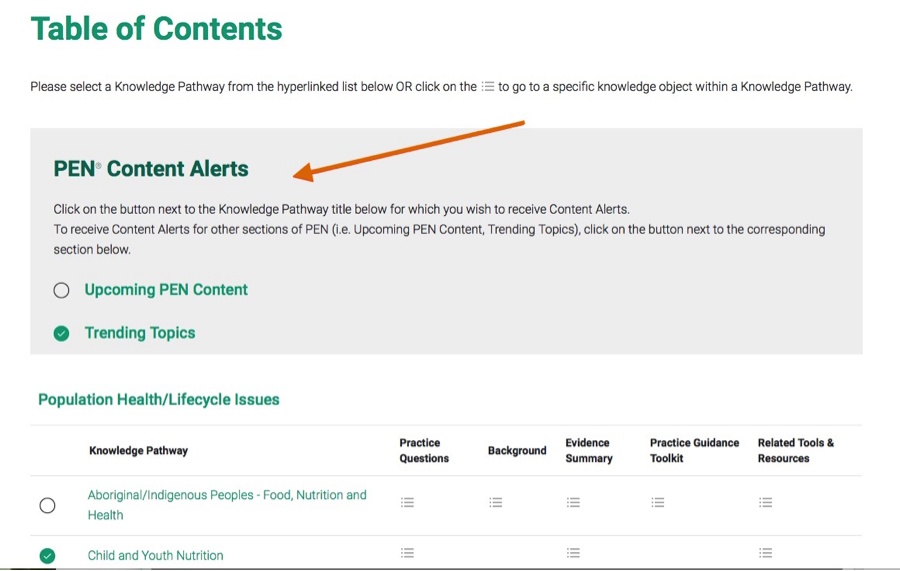
4. Check out our PEN Help and Support! Have a question about PEN? The PEN Help and Support section may answer what you are looking for.
5. Look at our PEN Training Materials! Interested in contributing to PEN, enhancing your capacity in evidence-based practice? Check out our PEN Training Materials section here.
6. Find where you are in the PEN Community! PEN is used by dietitians, academics, nutrition professionals and students around the world! Check here to find where you are in the PEN Community.
7. Submit a content idea! Have a topic or practice question you would like to see in PEN? Use the Submit a Content Idea button (once logged into PEN).

8. Stay tuned for September! Coming in September, PEN® navigation will be available in French and Spanish providing PEN® users with a customized experience!
9. Share your feedback! Once you’ve had a look at the new PEN® website, let us know what you think! Click New PEN Website Feedback button on the Dashboard or click here.

10. Use PEN to power your practice! Dietitians have practice-based questions – we have evidence-based answers, all with the click of a mouse. Launch back into PEN to see how we can help you!
Enjoy the same quality of evidence reviews, Trending Topics, client handouts and professional resources - but through a new and enhanced design! What are you waiting for? #LaunchBackIntoPEN
Announcements from the PEN community!
PEN is listed on the GRADE website!
We are pleased to share that PEN is now listed as one of the organizations using GRADE to find, critically appraise and synthesize the evidence to create practice guidance. We are featured alongside other astute organizations. 
Wondering about what is GRADE and why it matters to dietitians? Click here
Video builds interest for the International Congress of Dietetics in Granada Spain, 2016.
Can you feel the energy building for the International Congress of Dietetics(ICD) in Granada Spain? A video has been created of dietitians from around the world, sharing their enthusiasm for attending this upcoming conference.
Have a view of this video!
Contact Us
Do you have comments, questions or feedback? Please contact us:
Jayne Thirsk RD, PhD, FDC
Director of PEN®
Dietitians of Canada
jayne.thirsk@dietitians.ca
Sammie Gill BSc (Hons), PGDip, R.SEN, RD.
Policy Officer (Evidence-based Practice).
British Dietetic Association
globalpen@bda.uk.com
Natalie Latham APD
Communications Dietitian
Dietitians Association of Australia
communications@daa.asn.au
Kristyn Hall RD, MSc
Editor of PEN
® eNews
Dietitians of Canada
eNews@pennutrition.com
PEN eNews
June 2016 Volume
6 (1)
A Publication of the PEN® System Global Partners,
a collaborative partnership between International Dietetic Associations.
Learn more about PEN.
Copyright Dietitians of Canada
. All Rights Reserved.